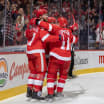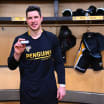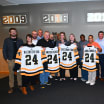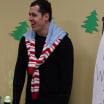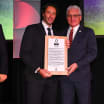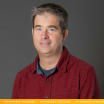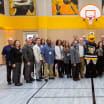Ventura Earns Key Role in Penguins Front Office
As director of hockey operations and hockey research, he'll handle contracts, the salary cap, CBA and analytics
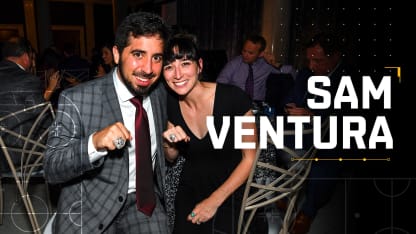
After Ventura - a graduate of Woodland Hills High School who has a Ph.D. in Statistics from Carnegie Mellon University - played a role in helping the Penguins win back-to-back Stanley Cups in 2016 and '17, he joined the organization full-time.
His job was to provide a quantitative assessment of players, teams, strategies, contracts and roster moves. Sometimes, that meant providing information to management and the coaching staff; other teams, it meant inventing new ways to analyze the game of hockey.
And the entire time, Ventura impressed management with his knowledge, creativity, communication ability and attitude, earning more and more responsibility.
"Sam has grown into a guy that quietly does work to set things up, like contract negotiations and things of that sort," Penguins general manager Jim Rutherford said. "And so he's gained a lot of experience over the last couple of years. He's a very bright guy."
That has earned Ventura, 32, a new role that expands beyond just analytics. He was recently named director of hockey operations and hockey research, and will work closely with Patrik Allvin, who was promoted from director of amateur scouting to assistant general manager.
Ventura will now handle contracts, the salary cap and everything dealing with the Collective Bargaining Agreement, in addition to his analytics duties. Allvin also said that Ventura will play a part in planning the Penguins' future.
"He'll be involved with players we sign and how our entry-level lineup looks like a year or two away," said Allvin, who has worked with Ventura the last three years on draft analytics. "The same goes for Wilkes-Barre. He'll have communication with the development staff on when the prospects would be eventually would be ready and what the plan is for each individual - like how many years do we see them playing in Wilkes-Barre and when they should be ready to play for the Pittsburgh Penguins."
"He'll handle a lot," Rutherford agreed.
For a local kid who became a Penguins fan when he was just 3 years old after watching them win their first-ever Stanley Cup in 1991 - and never really imagined having a career outside of academia - this truly is a dream come true.
\\\
Ventura grew up in Swissvale with his older brother Armand, younger brother John and their parents. His father Sal is a full-time musician who has a band called Dr. Zoot, while his mother Theresa is a support staffer at Carnegie Mellon University.
One of Sam's earliest childhood memories is watching the Penguins win the franchise's first Stanley Cup in 1991, when he was just 3 years old. And when they won again the next year, he was hooked.
The kids didn't take to the ice right away, as playing and equipment costs were just too expensive for the family, though Sam would occasionally go to stick time with his cousin at Center Ice Arena in Delmont when he got older.
Instead, the Ventura boys played dek hockey at the Greater Pitt Dek Hockey Rink, located in the Olympic Swim and Health Club, in nearby Penn Hills. They also invented a game called 'recycled hockey,' where they would get the blue bins, take them to the local tennis court and shoot the ball into said bins for their own version of dek hockey.
When the boys weren't running around playing dek hockey and baseball, they would be watching Penguins games. "When you're really little, it's a big deal if you're allowed to stay up past the second period," Sam recalled with a laugh.
Either way, when Sam woke up in the morning, he would immerse himself in the sports section of the local newspaper, looking at all of the NHL scores and statistics like the league leaders - a sign of things to come.
The family would also try to attend as many games as possible. And because Sam in particular loved the Penguins so much, his aunt and uncle would take him to Mellon Arena for a game for his birthday each year.
"That was pretty consistent throughout my childhood," he said.
When Sam was 17, he and two of his friends decided to spring for Penguins season tickets for Sidney Crosby's rookie season in 2005-06. They figured if they split the costs and the games between the three of them, it would be worth it. So they got a half-game plan, located in section F30, Row D, seats 3 and 4.
"We had a tradition," Ventura said. "We would go to Mineo's before every game and split a pizza, then we would walk up to the F balcony."
It was around that time Ventura, who would graduate at the top of his class from Woodland Hills High School in 2006, was deciding where to attend college.
"I wasn't quite sure what I wanted to do with my life," Sam said. "I knew I was good at math, but I didn't really have any direction in terms of where I wanted that to go."
He did know that he wanted to stay in Pittsburgh, and with Theresa working at CMU, which is located in Oakland, Sam figured that was an easy choice if he could get in with the quality of education and proximity to home.
And sure enough, he did. Once there, Ventura got the opportunity to start playing ice hockey regularly, as he was on his own schedule and had his own money. So not only did Ventura, who played center, join the ice hockey team - he played on the roller hockey team as well.
Off the ice, the difficulty level of the coursework was an adjustment for Ventura his freshman year, but he settled in his sophomore year and found more of a balance. Though he still wasn't sure what career path he wanted to take.
At first, Ventura thought he wanted to be in finance, but it was a strange time with the 2008 Great Recession happening. So he went to New York City to intern with a bank in their capital markets division, and quickly discovered finance wasn't for him.
"I liked the tools I was using to analyze data, but I didn't like the application assignments," Ventura said. "It was just so boring. And I just knew that I had to do something that would be more interesting than that. So luckily, I had some good academic advisors who told me I should go to grad school, and I listened."
And that's where Ventura's path to the Penguins began.
\\\
After earning a Bachelor's degree in Computational Finance and Statistics, Ventura began graduate school at CMU while also serving as an assistant coach for the men's ice hockey team (and continuing to play roller hockey, as there were no eligibility rules for that).
The program encouraged students to do side projects in something they were interested in. And it just so happened that during his senior year, Ventura took a class about applying statistical methods to the sporting world from a professor named Andrew Thomas, a Toronto native.
"He also loved hockey, and was very accomplished in the sports analytics field at that point," Ventura said. "I was obviously interested in all of that as well, so we decided to start working on a side project together."
The side project was inspired by the fact that there was a somewhat limited set of NHL statistics available publicly, and they wanted to figure out the best way to rate hockey players in a way that went beyond those metrics while still using that information.
"We wanted to make our final results interpretable and put it in terms that other people would understand, even if they didn't understand all the technical details," Ventura said.
That snowballed into a paper titled "Competing Process Hazard Function Models for Player Ratings in Ice Hockey," which was published in the Annals of Applied Statistics. And while
Ventura and Thomas were excited about their work, it didn't get quite the reaction they hoped it would.
"It wasn't really getting as much attention as we had thought," Thomas said. "So we decided we were going to go a little more public with the work we did."
That led to Ventura and Thomas co-founding the website War-on-Ice.com, meant to introduce fans to those more comprehensive metrics, in 2014.
An example of one of those metrics is in the website's name, as WAR stands for Wins Above Replacement, which measures a player's value by calculating the number of wins a player contributes to their team above that of a "replacement level player."
"It was nice because a lot of the stuff that we had for the site, we had already built for research," Thomas said. "For the papers we'd written and everything else, we had tools to get the data from NHL.com. Those had already been built. A lot of our graphical pieces had already been done. And even the thing that we had built to host it was something we'd already been using for student projects."
With most of the underlying infrastructure for the site already in place, Ventura and Thomas launched it relatively quickly. And this time, they did get the reaction they were hoping for.
Though both men said it helped that just a few days before, another hockey analytics website called Extra Skater shut down after its founder Darryl Metcalf got hired by the Toronto Maple Leafs.
"There was a little bit of a gap in that market, so when we made our website a few days later, everybody sort of latched onto it quickly," Ventura said. "We didn't have to do a lot of the work there. People did it for us. It was a series of very lucky things that happened for us that made things easy to get noticed."
And with that, War-on-Ice.com quickly became one of the most prominent sources of data and statistical analysis in the NHL, with Ventura and Thomas organizing the Pittsburgh Hockey Analytics Workshop that same year and presenting their research at various related conferences.
The following summer, Ventura and Thomas were at Hough's Taproom in Greenfield - their go-to spot for watching hockey over some beers - to discuss their next steps, like what they wanted to do next and the plans for the website moving forward.
It was at that moment Ventura received an email from former Penguins assistant general manager Jason Karmanos, asking if they could talk. Karmanos had been following along with Ventura's exploits in the hockey analytics world, and had heard nothing but positive things, so he decided to reach out.
After his phone pinged, Ventura joked to Thomas that any plans they had might have to change - something that as a mentor and friend, Thomas was more than okay with.
"It's every teacher's dream that their student gets to follow their dreams," said Thomas, who described Ventura as an inquisitive and careful student. "Because at the time, he's been a fan of this team since he was born. He's got plenty of evidence around this is who he supports, this is what he's really big into and that his family is hugely into it, too."
Thomas saw that firsthand when Ventura got a half day with the Stanley Cup in 2017.
"He had a little to-do at his house, then there was a bar that opened up for him and everyone in his whole community from Swissvale," Thomas said. "And so that alone, you see a sight like that, that just hits you right in the in the feels. You just feel good about that."
\\*
The Penguins hired Ventura as a consultant in the summer of 2015. Which worked perfectly for Ventura, who had earned a Masters of Science in Statistics in 2011, was finishing up his Ph.D. in Statistics and had a full-time job lined up on the faculty of the Department of Statistics and Data Science at CMU.
Initially, Ventura thought he would spend his entire career at a university - teaching, doing academic research, and working on sports analytics side projects with students. And while Ventura did do all of that for the next two years, he also played a role in helping the Penguins win two consecutive championships.
"On top of his work with the Penguins, Sam has always had a packed schedule," said Max Horowitz, one of his former students. "Whether he's editing papers as part of an editorial board for a statistics publication, giving a talk at a conference, planning and running events or spending time with his family, I don't know how he gets any sleep."
Ventura advised Horowitz on a football analytics research project before they co-wrote a paper together. And starting with the first course that Horowitz took from Ventura, his natural ability to communicate abstract concepts stood out.
"I always felt Sam did an outstanding job of explaining things at the most basic levels, using corollaries and analogies to make things relatable," Horowitz said. "In our industry, this is particularly important as oftentimes those who are trying to understand the insights you uncover don't necessarily have as deep of a statistical or mathematical background. Communicating insights in concise and understandable ways is an area where Sam excels."
That's a big reason why Ventura has been so well-liked and respected by his colleagues in the Penguins' hockey operations department since the moment he started.
"He's a good listener," Thomas said. "He's a guy that will ask good questions. He'll try to figure out what other people are thinking and engage them on their terms. That makes him a good professor, too."
Ventura is also always hungry to learn, another quality that stood out to Horowitz while taking his classes. And Ventura has brought that same mindset to the Penguins since Day 1.
"When I came in, I just tried to be as open-minded as possible and learn from the people who have been doing this for so long, and I think that's paid off," Ventura said. "The ultimate goal is to make the right decisions, and you're always going to make better decisions if you're open-minded and hearing what people have to say."
While Ventura is obviously brilliant, he's got a way of connecting to people and communicating that isn't always the case for someone as smart as he is. He can sit down with management, coaches and scouts and have a real back-and-forth dialogue.
"He shares information and takes on information, too, regarding players," Allvin said. "I think that's one area where I have really enjoyed working with Sam from an amateur perspective. He understands that from his perspective, numbers are just black and white, but now he's working with people, so it's a lot of gray areas. Then I think he's really respectful and humble and a true team player. That's why I'm excited to work with him."
And that's one of the many reasons Ventura, who resides in Regent Square with his wife Emily and baby daughter Josephine, who was born in February, earned this new role.
Not bad for a kid from Swissvale who went from not knowing what he wanted to do withhis career, to thinking he would spend it entirely in academia, to combining his love for hockey and statistics in a dream job as part of the hockey operations staff for his hometown Penguins.
"I'm excited for it, first of all," Ventura said. "It's always nice to be valued and thought of in a way where you can be considered for opportunities like that. My goal when I started working for the team was just to do as good of a job as I can to help us win more Stanley Cups, and that's always been the No. 1 goal."
And along the way, Ventura has been a role model and an inspiration for people like Horowitz, who is now the Senior Data Scientist in Basketball Strategy and Analytics for the NBA's Atlanta Hawks.
"Before I even knew Sam personally, I had heard and read about his research on War-on-Ice, and it gave me inspiration and hope that I could do something similar with the intent of making a career in the sports industry," Horowitz said. "Our research together and his support as I founded the Sports Analytics Club at Carnegie Mellon was a major key in how I got to where I am today.
"As a statistician, a sports enthusiast, and a critical and creative thinker, Sam is constantly raising the bar."
And raising Stanley Cups.


